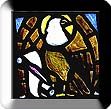 There has been some discussion in the biblioblogosphere in recent days about the possibility that words of Christian prophets, which would have been understood to be the words of the risen Christ, became intermingled in the oral (and eventually the written) traditions about Jesus in early Christianity. The conversation began at Singing in the Reign and continues at Metacatholic and Sean the Baptist.
There has been some discussion in the biblioblogosphere in recent days about the possibility that words of Christian prophets, which would have been understood to be the words of the risen Christ, became intermingled in the oral (and eventually the written) traditions about Jesus in early Christianity. The conversation began at Singing in the Reign and continues at Metacatholic and Sean the Baptist.
The clearest evidence that I can think of for Christian prophecy being attributed to the figure of Jesus during his public ministry is the Gospel of John. The author is quite explicit that Jesus will continue to speak to and through the community by means of the Spirit (John 16:12-13). And the stylistic differences between John and the other Gospels provide clear indication that, whatever one may make of the other Gospels in terms of their historicity, the Fourth Gospel gives us a voice speaking on behalf of Jesus, as it were, or in terms that the author would have agreed with and which relate to the present discussion, the words of a Christian leader who believed that Christ spoke through him by means of the Spirit, the Paraclete.
The case of John is fairly clear, given the author’s explicit statements and the ease of comparing the Synoptics to John. But I suspect that if we were to engage in a fair comparison, between the material that seems to be the historical bedrock of what Jesus actually said, shared between many sources, and the material that is unique in content and style to each Gospel, we might find that John simply has more material that is obviously created subsequently. It may also be the case that those who elaborated on the parables and created their own did not view themselves as engaging in prophecy in the way John did.
At any rate, it seems fair to emphasize that we are not dealing with a case of three against one agreement. Mark, Q and John are independent, and each has a certain uniqueness of style and content. And so it may be that none of the material we have gives us the style of Jesus, as it were.
In the case of all of the material we have in the earliest tradition, except for small snippets of words in Aramaic and a few poetic/rhyming sayings that could engrave themselves immediately on the memory almost verbatim, we have at best the gist of what Jesus said. And so it is crucial to ask not only whether Christian prophets created new sayings attributed to Jesus that became part of the oral tradition, but also how we distinguish such cases from the inevitable repetition in one’s own style and free performance that inevitably occurred in this predominantly oral context as Jesus’ deeds and teaching were remembered and repeated.












